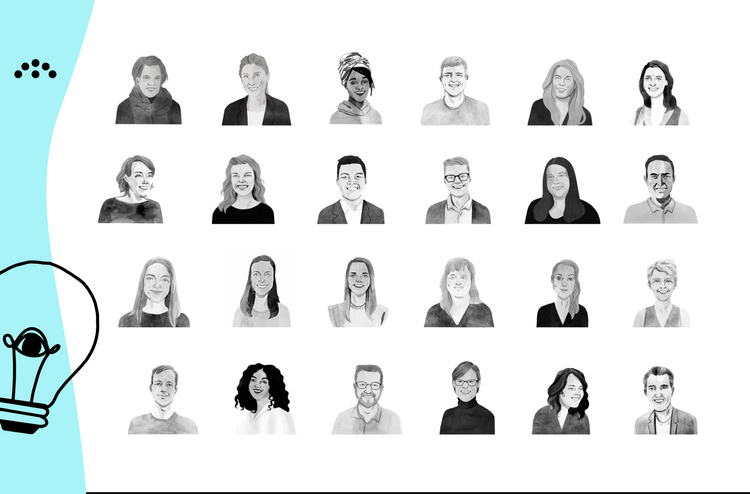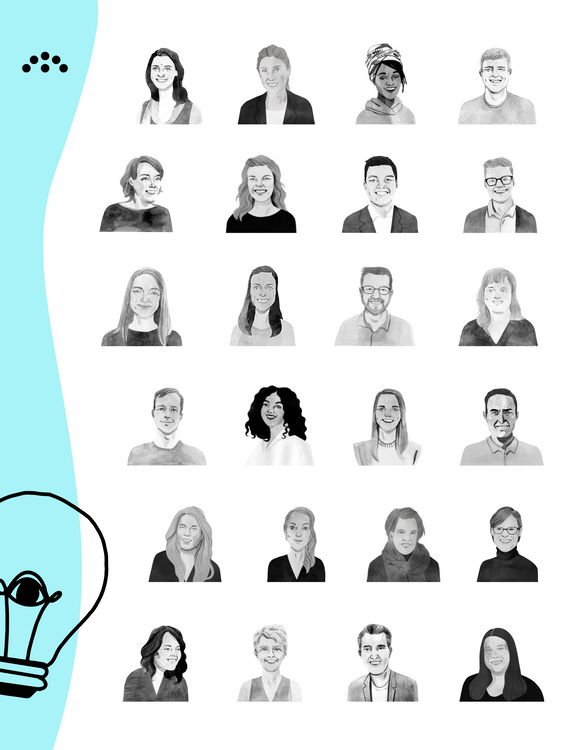Get to Know our Experts: Christian Dawson
Open Eye relies on the amazing talent of our Experts, whose experience and capabilities span the globe and a variety of industries. This Q&A will help you get to know what experiences Christian Dawson brings to Open Eye.
Hello Christian!
We’re so pleased to finally have you join our Expert Q&A series. As Co-Founder and Executive Partner, you have one of the longest relationships with Open Eye and we look forward to learning more about you and your journey in bringing us all together at Open Eye.
To begin, we’ll start with a question we asked our other Co-Founder, Hilary. Why did you decide to start Open Eye?
I need to give Hillary credit for the idea of the partnership. She and I were already working together on another part-time project. We would travel a lot and meet with small businesses. She watched many times as I offered a whole bunch of unsolicited advice, and talked to business leaders later, who reported that my ideas had been instrumental in changing their businesses. We both wanted the freedom that comes from working for ourselves, so she suggested we partner up offering consulting services for small businesses. At the time it was just the two of us, and we envisioned her role to be kind of like my agent. Since then, the plan has expanded significantly. Our roles have too.
Tell us about your career path up until this point, and some of the standout lessons that you’ve carried into managing Open Eye.
I’ve helped start and run multiple for-profit and nonprofit businesses. I’ve got lots of hands-on experience that I have brought into helping run this organization. Most of the lessons I bring into client engagements come from learnings I have made through personal successes and failures. Oftentimes, the failures have been the most successful teachers. I like opportunities to help guide clients away from pitfalls I have fallen into myself. I’d say the greatest lesson that I have learned is that businesses have a whole bunch of little systems that operate within them, and too often those internal systems are operating without a good understanding of the goals of the machine they’re a part of. People who don’t understand their impact to the greater mission have a tough time maximizing that impact. I like breaking down information silos, and trying to help everybody in a business feel like they are rowing in the same direction toward common goals.
How do you set up your week to produce quality work that you are proud of?
The thing that is really challenging for a good consultant is that you need to step into a business role in somebody else’s organization, and produce work that is as high or better quality as what a full-timer could produce, but with just a few hours of engagement. That only works with a ton of active listening. You have two ears and one mouth, and consultants need to use them in that proportion to be successful and produce valuable client work.
When you are a consultant, you need to be doing high-level work for one client, offering full-time quality work at a part-time rate, and then switch your brain to do something completely different for a completely different type of client in a completely different scenario. The context switching can be hard.
That’s why I am sure to block off part of every week for exercise, rest, meditation, and the kinds of things that helped me center myself enough to keep a clear mind. That’s the recipe for really being able to be present with clients and do the kind of high quality work they expect.
*At Open Eye, you’ve been such a force of thought leadership for all of us, someone we look to for thoughtful exchanges. On that note, we are curious what you think the top three most in-demand skills will be as we enter a world that is increasingly more digital and influenced by artificial intelligence. *
I appreciate that a great deal! It’s been a complete honor to be able to work with the incredible experts I get to engage with at Open Eye.
I’ve been working in technology for all of my adult life, and keep up to date with the new technologies because they are often the key to unlocking new human efficiencies. Have you ever noticed, though, that we never seem to save time no matter what tech advances come? The world just keeps getting busier. Without good boundaries, your workload will always expand to fill your available time.
I say that because it’s part of my answer of what skills are most important. It doesn’t have anything to do with knowing one specific new technology. Generative AI is a great example of a tool that has the capacity to save us a lot of time, but all it can really do is riff off of what’s been done before. To get good outputs you need good inputs. Garbage in gets garbage out. Having modern tech at our disposal is only useful, if they are used as tools in the right way.
My answer about the three most in demand skills isn’t dependent on today’s technology. To be good at what we do, you need:
Active listening skills:
This goes well beyond listening to clients. To really help solve client problems, you can’t just have them explain what they want from you. You need to understand how their operations work, to what end, and how solving the problem you are being tasked with feeds up to their greater goals. This takes a real desire to understand an organization’s hopes and dreams, and how they are all currently working to achieve them.“Blue sky” systems thinking, with a dash of realism:
We all know that “this is the way we’ve always done things”, is a terrible answer to why things are done. That being said, operations can’t be ripped and replaced for no reason just because ideally they’d be more efficient. We only have so much time and so much bandwidth, and all change creates friction long before it eliminates it. Once you firmly understand a company’s goals and systems, it’s good to imagine where they could be, if they were starting again from scratch tomorrow. But then when you’re prioritizing a plan for change you need to take a realistic approach to what the company can tolerate.Clear, direct, and empathetic communication skills:
The hardest part about change is the communication part, getting everybody to understand and stand behind, a new path forward. Change is uncomfortable. It often falls apart at the levels of an organization that weren’t a part of the process of determining it. You need to be willing to go out of your way to communicate - even over communicate - your plans to everybody those plans touch, explain what role they play in those plans, and what new expectations exist. Assuaging people’s concerns and helping them embrace change can make them great advocates
We are smart people solving hard problems, and no matter how tech advances these fundamental skills will remain essential.
Now that Open Eye has turned 11 years old, what is your vision for Open Eye in the next 11 years?
We got to work with a ton of amazing independent consultants who realize they can do more together, in collaboration with other experts, than they can do alone. When I think about the next ten years, I focus less on the kinds of clients I want us to work with, and more about how we make sure to be of service to our experts. The more we empower them, the more they’ll be able to effectively serve the needs of our clients.
As a cheerleader for positive change, how has Open Eye evolved and changed over the years since the vision you’ve had at launch?
We have an internal document we wrote called The Open Eye Way, which lists the qualities of an Open Eye consultant. I read that document and it really is a reflection of who we’ve been from the beginning. However, at the start, that framework, our ethos, wasn’t written down. It was just me, Hilary, and eventually Taylor, trying to do right by clients. Now we’ve got dozens of experts out there, and our responsibility is to work with them and coach them to operate under that ethos. Our jobs have become less about working with clients and more about helping the experts be the best they can be. Though that wasn’t my vision for where this would go, I couldn’t be more excited that it’s evolved that way.
What is your leadership style, and how do you foster a positive and productive work culture within your team?
My leadership style is really the classic servant leadership style as defined by Robert Greenleaf. When I meet a new partner, I don’t ask them to impress me with their skills. I ask them what they are passionate about, and what kind of work would really light them up to engage in. When we scope out projects and match them to experts, some of it is of course skill matching, but a lot of it is interest mapping. Finding ways to build successes for others is a path to success for the entire organization.
What is some of the magic that sets Open Eye apart from other consulting agencies?
I’m sure all consultancies say that they care, but we care to a fault. In fact, if we can’t get passionate about what it is you’re looking for us to do, we won’t touch the job. If we do, you’ll know we’re inspired to lean in and help. I’ve said many times that we built our consultancy out of bad experiences with other consultants, who cared more about extending their own contracts rather than solving problems for the client and completing the job. I’m proud that we put the client needs first, and are willing to get our hands dirty to help them achieve their goals.
Final question. What is the most memorable feedback you’ve ever received from a client?
I sit with the failures more than the successes, because they’re our best teachers. I’m lucky we have very few poor performing projects to reflect on, but they do exist. I can think of two projects we took that we probably shouldn’t have, one for a friend we cared about and wanted to help even though it wasn’t in our sweet spot, and the other that was right up our alley but not something we had any passion for. That latter one paid a lot, so it was compelling to do it anyway. Both proved to be projects with middling results. Both remind me to this day to not take projects just for the money, or because you really want to help a friend. It helps me turn down business that isn’t the right fit.
Thank you, Christian, for letting us pick your brain. It’s been a pleasure getting you acquainted with our community here at Open Eye. We look forward to all of the meaningful work that is to come.
- Published
- 2023/08/22
- Consultants
- Expertises
- Growth Partnerships
- Technology
- Strategy and Consulting
Work with Christian
Are you ready to talk to one of our experts about your project?
The door is wide open, we can’t wait to meet you!

